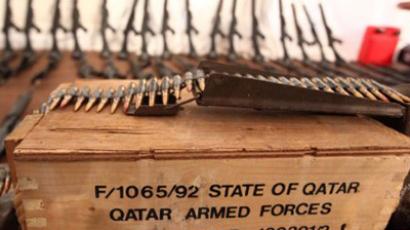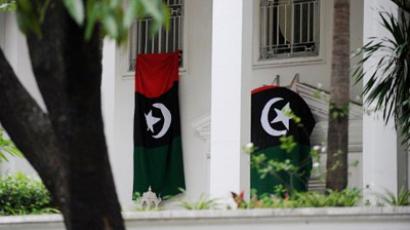Trigger terror as gun fever grips Tripoli
As loyalist troops continue to defend Colonel Gaddafi's home town of Sirte, Libya's National Transitional Council (NTC) has revealed its post-war election plans.
According to the constitution outlined by the NTC, democratic elections in Libya are due to take place some 240 days after the Council proclaims the “liberation” of the country. However, that can only happen after Libya’s incumbent leader, Muammar Gaddafi, whose whereabouts remain unknown, is captured or killed. The NTC’s Constitution, revealed by Reuters news agency, defines how the country will be governed in the transitional period after it emerges from months of war.Meanwhile, NATO says it has no immediate plans to end its operations in Libya, despite the rebels now controlling most of the country.The Alliance is currently engaged in bombing the town of Sirte, the main pro-Gaddafi stronghold where the colonel was born. However, the town has shown little sign of surrendering.
According to Phyllis Bennis of the Institute for Policy and Studies, it is still unclear whether NATO is ready to listen to the Libyan people.“We do know that the NATO military actions have already gone beyond what was authorized by the UN resolution, and now we do not know how they will define their future role,” she said. “Whether NATO is prepared to listen to what the Libyan leadership itself says, we do not know yet. They do not have a good history. Some of the rebels in Misrata, for instance, said directly they do not believe that the National Transitional Council speaks for them.”
Sabah Al-Mukhtar, president of the Arab Lawyers Association, says that Libya has ceased being a state, and is now just prey for the world powers.“We must recognize that what has happened is that a state has disappeared; now there is a vacuum,” he told RT. “Britain, France, Italy, the United States – each one of them is trying to get piece of the cake at the end of the day. There is certainly the potential for a civil war. There are quite a lot of factors, which those who are against Libya, including some of the Western countries, will for their own reasons [use to] divide the nation on a variety of levels.
According to blogger and political activist Raed Jarrar, the United States is currently repeating its mistakes from Iraq in Libya. “I think there are some differences between the Iraqi case and Libyan case, but overall what happened in Iraq is how foreign military interventions look like,” he said. “They destroy the country’s sovereignty and the government’s legitimacy. People, unfortunately, will see the same symptoms in Libya, the same problems of a lack of legitimacy for a government that is seen as a puppet government.”
Guns, guns, guns
Libyan rebel Mohammad Errabti got a bullet in his ankle fighting against Gaddafi’s soldiers in Tripoli. But the shot came from his own side. “I didn’t even notice until my friend told me that my foot was bleeding. He pulled the trigger by mistake. He was so scared himself,” Mohammad remembers.This is reality in today’s Libya. Following the rebels’ triumphant march through the country, tons of Gaddafi’s captured weapons have fallen into the hands of non-professional fighters.One of the biggest stores was discovered at the Abu Slim top-security prison in Southern Tripoli, where inmates were released after NATO bombed the area.Abu Slim district resident Abdu was among the first at the scene and helped to destroy the arsenal. He refused to appear on camera, still fearing revenge from Gaddafi loyalists.“I don’t want weapons to fall into the hands of my sons or other youngsters. I’m concerned where our country will be going with that. This is a very dangerous thing, it’s not a toy,” says Abdu, the father of three young boys.But with the country awash with arms, it looks like Libyan children have already developed a fascination for the weapons of war.A boy named Mohammad, holding a toy pistol, says “When I grow up, I’ll have real one and I will kill bad guys like Gaddafi.”The new authorities say that when the police are back on the streets, they will start gathering the weapons up through the mosques. The young gunmen are showing willing too, saying they will give their guns up as soon as they are asked to do so.But many in Tripoli are afraid that that this addiction may have painful withdrawal symptoms.The gun has become one of the symbols of the Libyan rebels and freedom. People want more peaceful symbols for their new country, but fear that it will not be easy for many to lay down their arms when the gun has played such a prominent role throughout Libya’s volatile history.














